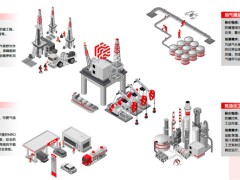据安迅思能源7月26日消息称,埃尼集团和肯尼亚石油和矿业部签署了一份谅解备忘录,以通过整个生物燃料生产价值链上完全整合的循环经济的新工业模式促进脱碳进程以应对气候变化。
双方将共同开展可行性研究,以发展废物和残渣收集以及农业项目,目的是建立广泛的原料来源,不与食品循环竞争,转化为生物燃料和生物产品,可能有助于为埃尼在意大利格拉和威尼斯的生物精炼厂提供饲料。双方还将评估将蒙巴萨炼油厂改造成生物炼油厂的机会,以及利用埃尼技术 Ecofining™ e Proesa 建造一座新工厂,利用废弃生物质生产第二代生物乙醇。
农业发展项目的重点是发展可持续油料作物种植,即低ILUC(间接土地利用变化)原料,如覆盖作物、退化土地上的蓖麻、农林业系统中的巴豆树和其他农工业副产品。
这一举措将有助于肯尼亚能源结构的多样化和支持整个脱碳进程,同时也减少该国对进口石油产品的依赖。其他预期收益包括发展可持续农业活动和循环经济、利用可再生能源发电、促进当地产业的经济竞争力和创造新的就业机会。
该协议有助于实现《巴黎气候变化协定》的目标和联合国可持续发展目标。这些项目还有助于实施《肯尼亚生物能源战略》、《国家自主贡献更新》、《肯尼亚国家发展计划》,包括《肯尼亚2030愿景》。此外,这些举措也符合埃尼集团在脱碳过程中发挥关键作用的承诺,以及该公司到2023年实现无棕榈油的目标,以及到2024年将生物炼油厂产能翻倍至约200万吨的目标。自2013年以来,埃尼公司一直通过子公司埃尼肯尼亚公司在肯尼亚开展业务。
朱佳妮 摘译自 安迅思能源
原文如下:
Eni will use biofuels from Kenya for plants in Italy
Eni and the Ministry of Petroleum and Mining of Kenya signed an MoU to promote the decarbonization process to tackle climate change through new industrial models of fully-integrated circular economy along the whole bio-fuel production value chain.
The parties will jointly conduct feasibility studies to develop waste and residue collection as well as agricultural projects, with the purpose of establishing a wide range of feedstock sources that do not compete with food cycles, to be transformed into bio-fuels and bio-products that might contribute to feed Eni’s bio-refineries in Gela and Venice, Italy. The parties will also assess the opportunity of converting Mombasa refinery into a bio-refinery, as well as the construction of a new plant for second-generation bio-ethanol from waste biomass, leveraging on Eni technologies Ecofining™ e Proesa.
The agricultural development project focuses on the development of sustainable oil crop cultivations - namely, low ILUC (indirect land use change) feedstock such as cover crops, castor in degraded lands, croton trees in agro-forestry systems and other agro-industrial co-products.
This initiative will contribute to diversifying Kenya’s energy mix and supporting the overall de-carbonization process, while also decreasing the Country’s dependence from imports of petroleum products. Other expected benefits include developing sustainable agricultural activities and circular economy, producing power from renewable sources, fostering the economic competitiveness of the local industry and creating new jobs.
The agreement contributes to the objectives of the Paris Agreement on Climate Change and to the UN Sustainable Development Goals. The projects also contribute to the implementation of the Kenya Bioenergy Strategy, Updated Nationally Determined Contribution, Kenya’s National Development Plans, including Kenya Vision 2030. Also, the initiatives are in line with Eni’s commitment to play a pivotal role in the decarbonization process and with the Company’s target to become palm-oil free by 2023 and to double bio-refineries capacity to around 2mln tons by 2024. Eni has been present in Kenya since 2013 through its subsidiary Eni Kenya.
免责声明:本网转载自其它媒体的文章,目的在于弘扬石化精神,传递更多石化信息,并不代表本网赞同其观点和对其真实性负责,在此我们谨向原作者和原媒体致以敬意。如果您认为本站文章侵犯了您的版权,请与我们联系,我们将第一时间删除。







